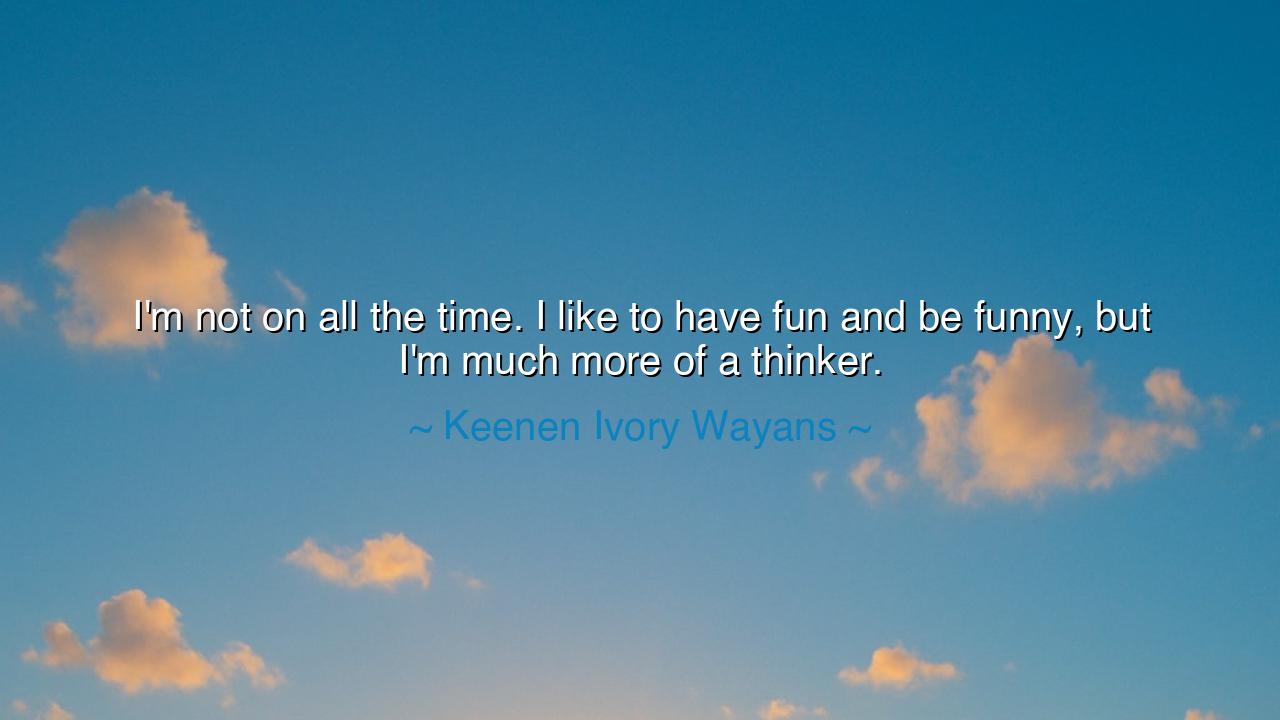
I'm not on all the time. I like to have fun and be funny, but I'm
I'm not on all the time. I like to have fun and be funny, but I'm much more of a thinker.






In the words of Keenen Ivory Wayans, “I’m not on all the time. I like to have fun and be funny, but I’m much more of a thinker,” we find a truth older than the stars—one that whispers of balance, of the dual nature within all who create, lead, and live deeply. To be “on” is to perform, to pour energy outward into the world, a flame that dazzles but cannot burn forever. Yet to be a thinker is to return to the quiet hearth within, where reflection refines the soul and meaning is reborn. This quote is not a denial of joy or wit, but a sacred reminder that the mind and the heart must breathe—in rhythm, not in constant motion.
In ancient times, philosophers and warriors alike understood this truth. Marcus Aurelius, emperor and Stoic sage, wore the crown of Rome yet sought silence in his journal each night. Amid the roar of the Colosseum and the demands of empire, he found refuge in thought, in stillness. He, too, “was not on all the time.” His laughter was quiet, his joy restrained, yet his wisdom echoed through millennia. The same spirit breathes in Wayans’ words—a realization that brilliance is not found in constant display, but in the measured alternation between creation and contemplation.
To “be funny” is to lift others from sorrow; it is the art of light. Yet even light casts a shadow, and it is there, in the still darkness, that insight grows. The thinker withdraws not from the world, but into it—beneath its noise, beneath its surface. The ancients called this gnosis, the inner knowing that only silence can awaken. A man who is “always on” may entertain the world, but a man who can pause, listen, and think—he transforms it.
Consider the life of Leonardo da Vinci. To the courts of Florence and Milan, he was a performer of wonders—sketching flying machines, designing pageants, painting angels that seemed to breathe. Yet when the laughter faded and the oil paints dried, Leonardo vanished into solitude, his notebooks whispering of anatomy, flight, and the mechanics of the cosmos. His greatest works were born not from constant showmanship, but from deep thought, from the quiet humility of one who understood that inspiration needs the space of stillness to take form.
In our modern age, the call to be “on” resounds louder than ever—to post, to speak, to shine, to perform. But Wayans’ wisdom reminds us that this unbroken flame consumes more than it illuminates. The soul must rest as the moon rests from the sun. To think, to retreat, to ponder—is not to dim one’s light, but to preserve it, to temper the fire so that it burns clear and strong when it returns to the world. Even laughter, divine as it is, must be balanced by listening.
The lesson, then, is clear: Do not mistake motion for meaning, nor noise for depth. The world reveres those who sparkle without pause, yet it is the quiet minds who shape destiny. To live well is to alternate between joy and reflection, between the outward pulse of life and the inward breath of thought. Just as the ocean’s tide must ebb before it can rise again, so too must the spirit rest before it creates anew.
So, my child, when the world demands that you be “on” without cease—step back. Walk beneath the trees, let silence be your companion, and think. Let your laughter return when it is full, not forced. Speak when your heart is ready, not merely when it is heard. For in that balance between fun and thought, between performance and purpose, you will find the sacred rhythm of a life well-lived. And from that rhythm, your own wisdom will be born.
Practical teaching: Each day, take a moment to withdraw from the noise. Ten minutes of silence—no phone, no talk, no thought of the world. Ask yourself: What have I learned today? What truth waits in my stillness? Do this daily, and you will find that your laughter becomes more genuine, your words more powerful, your mind sharper. For the true thinker is not one who hides from the world, but one who returns to it with clarity, peace, and the strength of a quiet soul.






AAdministratorAdministrator
Welcome, honored guests. Please leave a comment, we will respond soon